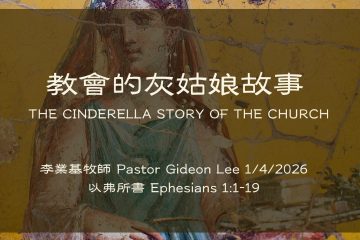希伯來書 Hebrews 13:7-17 李業基牧師 Gideon Lee 2/9/2025
What (v. 7, 17)?
觀察、效法、信任、服從那些帶領你們的人。
- 第 7 節中的領袖似乎主要是指創立教會的元老,他們奠定了信仰的根基。 第 17 節中提到帶領讀者的人卻是主要指現在服事他們的領袖。
- 作者要讀者仔細觀察第 7 節提到的第一代領袖,創立教會的元老,要讀者看到他們一生工作的成果,並效法他們的信仰。
- 在第 17 節中,作者要讀者信靠並服從今日這一代服事他們的領袖。
- 這個區別當然只是強調的問題。
- 基督徒在跟隨領袖時,需要有一個平衡的觀點。
How (v 8, 15-16)?
觀察帶領你們的人如何獻祭: 他們承認耶穌的名,他們行善分享。
- 無論是過去和現在的領袖,他們有任何的權柄都是建立在他們是不是跟基督連結。
- 雖然讀者應該尊重過去和現在的領袖,但也需要根據耶穌基督的教導來審核自己和領袖的言行。
- 今日有些在教會中四處奔走,號稱自己「教師」的人,是否在散播一些錯誤的教導。
- 首先,也是最重要的,這些教導與他們創會元老的看法不一樣。
- 第二,這些教導將原本耶穌基督無條件的白白恩典,變成有條件,使宗教儀式變成為得救條件的一部分。
- 第三,這些注重宗教儀式的教導,使基督徒偏離了他們應該專心做的實質善行。
- 當終極獻祭耶穌已經降臨,我們不再用動物作為贖罪祭。
- 雖然幫助貧困做善事不是向祭司奉獻祭物,但就道德意義而言,仍然算得是給向神獻禮物。
- 出錢。出血。出城。
Why (vs. 14)?
因為在這裡,我們沒有長存的城;相反,我們是在尋求那將要來臨的城。
- 我們也需要像耶穌基督一樣。出到營外,出到城外。成為祭物。不單止是在出錢,甚至出血。而是出自己。
- We meet to part, but part to meet. 我們相聚是為了離別,離別是為了相聚。
- 這後來的殿的榮耀必大過先前的榮耀。
What (v. 7, 17)?
Observe, imitate, trust, obey those who lead you.
- The leaders in verse 7 seem to mainly refer to the founding fathers of the church, who laid the foundation of the faith. The people who lead the readers in verse 17, however, mainly refer to the leaders who are currently serving them.
- The author wants the reader to carefully observe the first generation of leaders mentioned in verse 7, the founding fathers of the church, and to see the results of their lifelong work and imitate their faith.
- In verse 17, the author wants the reader to trust and obey the leaders of this generation who serve them today.
- Of course, this distinction is only a matter of emphasis.
- Christians need a balanced perspective when following their leaders.
How (v 8, 15-16)?
Observe how those who lead you sacrifice: they acknowledge the name of the Lord; they share what they have.
- Whether they are past or present leaders, any authority they have is based on whether they are connected to Christ.
- Although readers should respect past and present leaders, they also need to examine their own words and deeds and those of the leaders according to the teachings of Jesus Christ.
- Some Judaizing Christians ran around in the church, claiming to be “teachers,” were they spreading some false teachings?
- First and foremost, these teachings differ from the views of the founding fathers.
- Second, these teachings turn the original unconditional free grace of Jesus Christ into conditional, making religious rituals part of the conditions for salvation.
- Third, these teachings that emphasize religious rituals cause Christians to deviate from the substantial good deeds they should be focusing on.
- When the ultimate sacrifice of Jesus had come, we no longer used animals as atonement offerings.
- Although helping the poor and doing good deeds is not offering sacrifices to priests, in terms of moral significance, it is still considered offering gifts to God.
- Donate money. Donate blood. Donate your body.
Because here we have no lasting city, but we are looking for the one to come.
Why (vs. 14)?
- We also need to be like Jesus Christ. Go out of the camp, go out of the city. Become a sacrifice. Not only are we giving money, we are even bleeding. But we are giving ourselves.
- We meet to part, but part to meet. We meet to part, part to meet.
- The glory of this later temple will be greater than the glory of the former.


